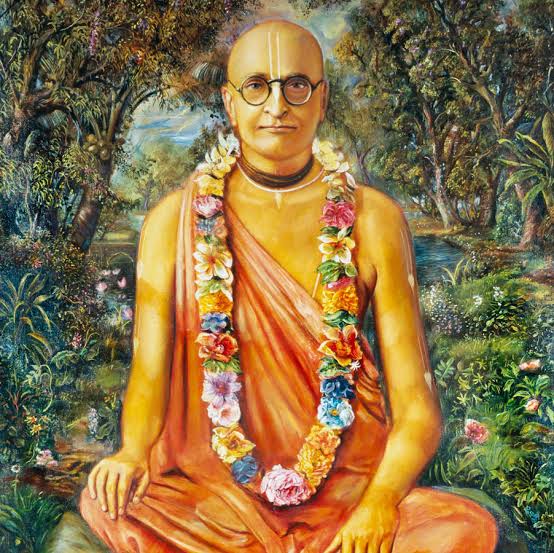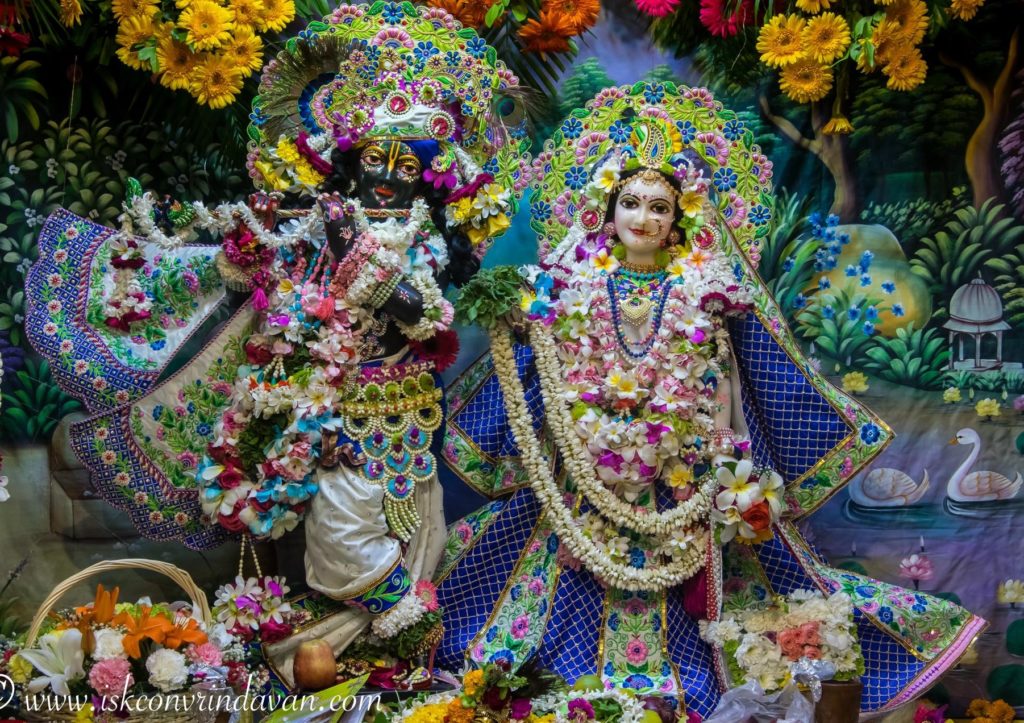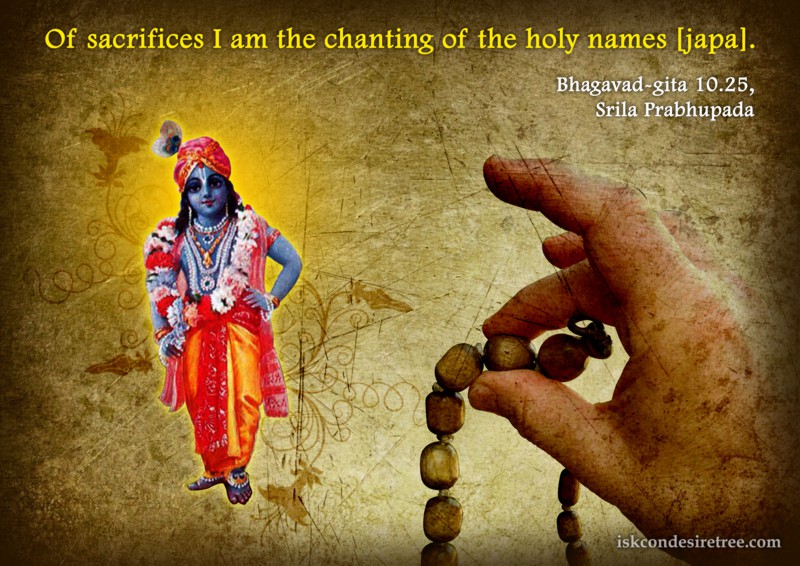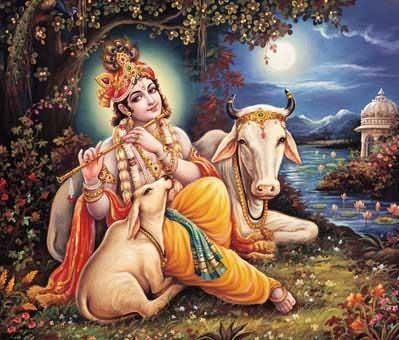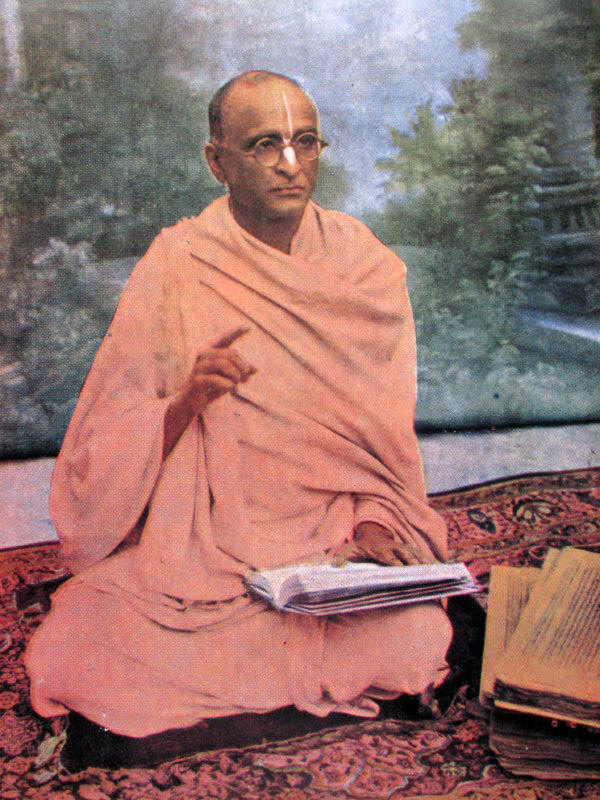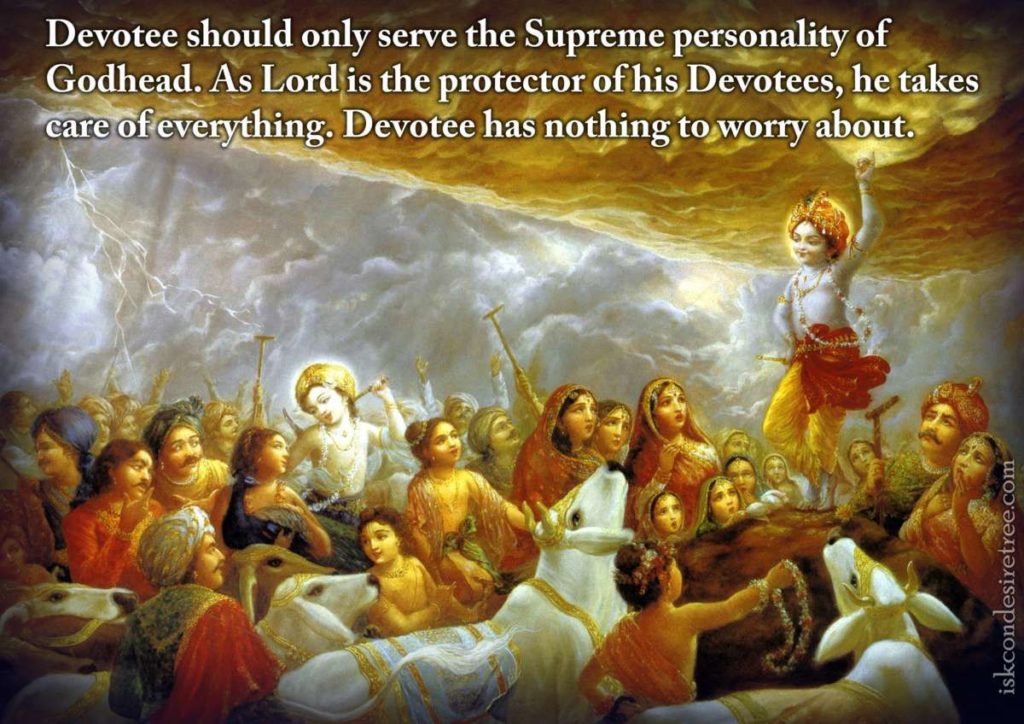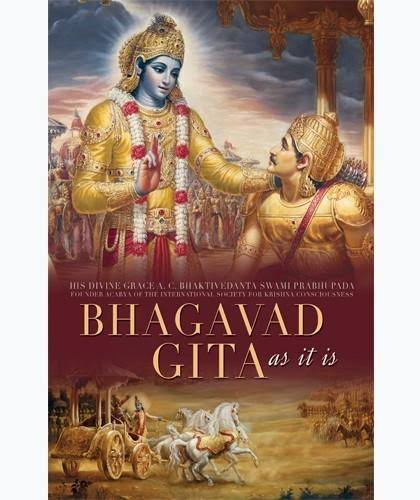
December is the month in which Krishna spoke Bhagavad gita to Arjuna. The exact day, also known as Gita Jayanti, falls on Moskshada Ekadasi. December is also the month in which book distribution exploded in the west in seventies. Since then devotees in ISKCON have worked hard to keep the same spirit alive. Come December and all over the world ISKCON devotees come out on the streets to distribute Bhagavad gita to the general public, its also called book marathon. As Gita Jayanti month comes to an end let me share a wonderful verse to meditate upon, which I recently heard in a lecture from HG Srimati Mataji. I am sharing brief excerpts from her lecture and the verse below.
The context of this verse is that Krishna has left the planet and Arjuna is feeling pangs of separation from Him.
HG Srimati mataji: If we are essence seekers then we should be aware that Krishna speaking Bhagavad gita to Arjuna is not the end of the story. There is a second advent of Bhagavad gita to Arjuna. When he is in separation from Krishna Bhagavad gita advents in his mind and guides him back home. That’s very very special for us, so as an essence seeker that’s where we should look next.
We can never beat gita in terms of shastra, it is an amazing scripture. We always talk about Bhagavatam. In Bhagavatam we learn about names of Krishna, we learn about form of Krishna, we learn about pastimes of Krishna – that is wonderful but none of those things have any substance in terms of us having a relationship with the person if we don’t the mind of the person. What’s the value me knowing your form if we don’t know where we are at. How can I relate to him on real terms. So Krishna is revealing His mind in Bhagavad gita. And it is these instructions, its not all the amazing experiences that Arjuna had with Krishna that gave him actual solace. He remembered them but that wasn’t what that gave him the solace. What enlivened and illuminated his heart was the instructions Govindadev gave. I find that pretty amazing and for me personally celebration of Gita Jayanti is not complete unless we look at this. (pause)
Here is the special verse :
देशकालार्थयुक्तानि हृत्तापोपशमानि च ।
हरन्ति स्मरतश्चित्तं गोविन्दाभिहितानि मे ॥ २७ ॥
Now I am attracted to those instructions imparted to me by the Personality of Godhead [Govinda] because they are impregnated with instructions for relieving the burning heart in all circumstances of time and space.
Purport:
Herein Arjuna refers to the instruction of the Bhagavad gita, which was imparted to him by the Lord on the Battlefield of Kurukṣetra. The Lord left behind Him the instructions of the Bhagavad gita not for the benefit of Arjuna alone, but also for all time and in all lands. The Bhagavad gita, being spoken by the Supreme Personality of Godhead, is the essence of all Vedic wisdom. It is nicely presented by the Lord Himself for all who have very little time to go through the vast Vedic literatures like the Upaniṣads, Purāṇas and Vedānta-sūtras. It is put within the study of the great historical epic Mahābhārata, which was especially prepared for the less intelligent class, namely the women, the laborers and those who are worthless descendants of the brāhmaṇas, kṣatriyas and higher sections of the vaiśyas. The problem which arose in the heart of Arjuna on the Battlefield of Kurukṣetra was solved by the teachings of the Bhagavad gita. Again, after the departure of the Lord from the vision of earthly people, when Arjuna was face to face with being vanquished in his acquired power and prominence, he wanted again to remember the great teachings of the Bhagavad gita just to teach all concerned that the Bhagavad gita can be consulted in all critical times, not only for solace from all kinds of mental agonies, but also for the way out of great entanglements which may embarrass one in some critical hour.
The merciful Lord left behind Him the great teachings of the Bhagavad gita so that one can take the instructions of the Lord even when He is not visible to material eyesight. Material senses cannot have any estimation of the Supreme Lord, but by His inconceivable power the Lord can incarnate Himself to the sense perception of the conditioned souls in a suitable manner through the agency of matter, which is also another form of the Lord’s manifested energy. Thus the Bhagavad gita, or any authentic scriptural sound representation of the Lord, is also the incarnation of the Lord. There is no difference between the sound representation of the Lord and the Lord Himself. One can derive the same benefit from the Bhagavad gita as Arjuna did in the personal presence of the Lord.
The faithful human being who is desirous of being liberated from the clutches of material existence can very easily take advantage of the Bhagavad gita, and with this in view, the Lord instructed Arjuna as if Arjuna were in need of it…. The Bhagavad gita is therefore meant for terminating all different types of miseries, and Arjuna took shelter of this great knowledge, which had been imparted to him during the Kurukṣetra battle.
HG Srimati mataji: ….That’s why Prabhupada gave us Bhagavad gita. How many of us read Bhagavad gita daily? We do not understand the preciousness or the potency of Bhagavad gita of what Prabhupada has given us. It’s not only because of the instructions that have been given, its because Bhagavad gita is the words of Govindadev, adi purusham Govindadev. Words of Govindadev are nondifferent from Govindadev. So just by associating with the words of Bhagavad gita we are directly associating with Govindadev.
And if you are chanting Bhagavad gita every day then it’s such an amazing thing , because you are not just chanting those words but they are Govinda’s words. And the potency of it is that immediately, just by the act of you repeating Govindadev’s words, you are properly situated as His servant. And just by the act of you chanting Bhagavad gita daily you get His shelter, you get His protection, you get His guidance, you get everything because you are properly situated in His service. Just by repeating His words! It’s amazing. We are not aware of the potency and the incredible depth what Prabhupada has given us.
How many people read Bhagavad gita daily? Who reads Gita daily? Nobody is interested in Gita. There are just so many other things. But Gita is where you start. As I said in the beginning, if we don’t know a person’s mind what’s so important about knowing what he looks like or what he does- it’s so shallow. Where is the relationship? How can you have a relationship with somebody if we don’t know their mind? We may be able to rattle of about everything they do and rattle of about what they look like but have you had any depth of relationship with that person? You can’t. Gita at so many levels is so amazing. (pause)
Hearing the self-illuminated verse, Prabhupada’s purport and Srimati mataji’s lecture all had a combined effect on my heart and I felt inspired to start reading one chapter of Bhagavad gita daily – verses and their translation.
We make so many new year resolutions or keep different vratas throughout the year. So it may not be such a bad idea to resolve to chant the words of Govindadev daily and get an opportunity to closer to Krishna’s lotus feet. It may well be the support we need to fill our heart with enthusiasm, determination and patience to progress solidly in Krishna consciousness.
All glories to Sri Bhagavad Gita
All glories to Srila Prabhupada
your servant,
Giriraj dasa

